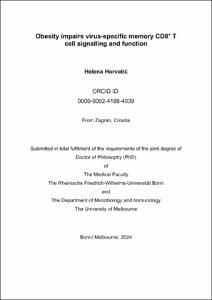Horvatić, Helena: Obesity impairs virus-specific memory CD8+ T cell signalling and function. - Bonn, 2024. - Dissertation, Rheinische Friedrich-Wilhelms-Universität Bonn, University of Melbourne.
Online-Ausgabe in bonndoc: https://nbn-resolving.org/urn:nbn:de:hbz:5-75727
Online-Ausgabe in bonndoc: https://nbn-resolving.org/urn:nbn:de:hbz:5-75727
@phdthesis{handle:20.500.11811/11488,
urn: https://nbn-resolving.org/urn:nbn:de:hbz:5-75727,
author = {{Helena Horvatić}},
title = {Obesity impairs virus-specific memory CD8+ T cell signalling and function},
school = {{Rheinische Friedrich-Wilhelms-Universität Bonn} and {University of Melbourne}},
year = 2024,
month = apr,
note = {The main function of the immune system is to protect the host against invading pathogens. Immunological memory is formed after a primary infection and serves to provide protection in a fast and vigorous manner upon secondary encounter with the same pathogen. Under obesity conditions, however, protective immunity is impaired, constituting a significant risk factor for high incidence and severity of re-infections. Indeed, during the current COVID-19 pandemic, obesity has been recognized as a major risk factor for adverse clinical outcomes. Impaired immunity observed in obese individuals has been attributed to a dysfunction in CD8+ T cells, which are essential for the elimination and sterile clearance of viral infections. Yet, the underlying mechanisms of the immune-compromised status of obese individuals remain poorly understood.
Using mouse models of diet-induced obesity and lymphocytic choriomeningitis virus infection, we showed increased morbidity and mortality of obese mice after re-infection, recapitulating the clinical situation in humans. Obese mice failed to mount protective immunity and showed a profound loss of virus-specific memory CD8+ T cells in the spleen and liver. This phenotype was associated with a compromised proliferation capacity and reduced ability to produce the effector cytokines IFNg and TNFa. Furthermore, our data revealed a severe decline specifically within hepatic tissue-resident memory T cell pool, which positively correlated with the body weight and contributed to the severe symptoms observed in obese mice. Additionally, we observed enhanced accumulation of IgA+, IL-10 producing, and PD-L1+ B cells in the liver of obese mice, and their
absence was associated with normal numbers of hepatic tissue-resident memory T cells. Notably, genetic ablation of IL-10 production by B cells did not reconstitute the memory response, indicating that IgA+ B cells do not exert a suppressive effect towards the virus-specific CD8+ T cells via IL-10. Furthermore, our findings show that the impaired memory response in obese mice is due to T-cell intrinsic mechanisms driven by long-term exposure of virus-specific memory CD8+ T cells to the inflammatory environment, rather than by affecting their development and recruitment. Molecular analysis revealed transcriptional reprogramming of memory CD8+ T cells under obesity conditions, resulting in impaired T-cell receptor signaling. The obesity-inflicted changes in memory CD8+ T cells were highlighted by the impairment of Ca2+ influx upon CD8+ T cell stimulation in vitro. Collectively, our findings indicate that virus-specific memory CD8+ T cells exposed to an obese environment lose their ability to confer protection. The future intention of this project is to identify key molecules within the Ca2+ signalling pathway that could be therapeutically modulated to improve the ability of virus-specific memory CD8+ T cells to provide protection and to improve the immune response of obese individuals to re-infections.},
url = {https://hdl.handle.net/20.500.11811/11488}
}
urn: https://nbn-resolving.org/urn:nbn:de:hbz:5-75727,
author = {{Helena Horvatić}},
title = {Obesity impairs virus-specific memory CD8+ T cell signalling and function},
school = {{Rheinische Friedrich-Wilhelms-Universität Bonn} and {University of Melbourne}},
year = 2024,
month = apr,
note = {The main function of the immune system is to protect the host against invading pathogens. Immunological memory is formed after a primary infection and serves to provide protection in a fast and vigorous manner upon secondary encounter with the same pathogen. Under obesity conditions, however, protective immunity is impaired, constituting a significant risk factor for high incidence and severity of re-infections. Indeed, during the current COVID-19 pandemic, obesity has been recognized as a major risk factor for adverse clinical outcomes. Impaired immunity observed in obese individuals has been attributed to a dysfunction in CD8+ T cells, which are essential for the elimination and sterile clearance of viral infections. Yet, the underlying mechanisms of the immune-compromised status of obese individuals remain poorly understood.
Using mouse models of diet-induced obesity and lymphocytic choriomeningitis virus infection, we showed increased morbidity and mortality of obese mice after re-infection, recapitulating the clinical situation in humans. Obese mice failed to mount protective immunity and showed a profound loss of virus-specific memory CD8+ T cells in the spleen and liver. This phenotype was associated with a compromised proliferation capacity and reduced ability to produce the effector cytokines IFNg and TNFa. Furthermore, our data revealed a severe decline specifically within hepatic tissue-resident memory T cell pool, which positively correlated with the body weight and contributed to the severe symptoms observed in obese mice. Additionally, we observed enhanced accumulation of IgA+, IL-10 producing, and PD-L1+ B cells in the liver of obese mice, and their
absence was associated with normal numbers of hepatic tissue-resident memory T cells. Notably, genetic ablation of IL-10 production by B cells did not reconstitute the memory response, indicating that IgA+ B cells do not exert a suppressive effect towards the virus-specific CD8+ T cells via IL-10. Furthermore, our findings show that the impaired memory response in obese mice is due to T-cell intrinsic mechanisms driven by long-term exposure of virus-specific memory CD8+ T cells to the inflammatory environment, rather than by affecting their development and recruitment. Molecular analysis revealed transcriptional reprogramming of memory CD8+ T cells under obesity conditions, resulting in impaired T-cell receptor signaling. The obesity-inflicted changes in memory CD8+ T cells were highlighted by the impairment of Ca2+ influx upon CD8+ T cell stimulation in vitro. Collectively, our findings indicate that virus-specific memory CD8+ T cells exposed to an obese environment lose their ability to confer protection. The future intention of this project is to identify key molecules within the Ca2+ signalling pathway that could be therapeutically modulated to improve the ability of virus-specific memory CD8+ T cells to provide protection and to improve the immune response of obese individuals to re-infections.},
url = {https://hdl.handle.net/20.500.11811/11488}
}





